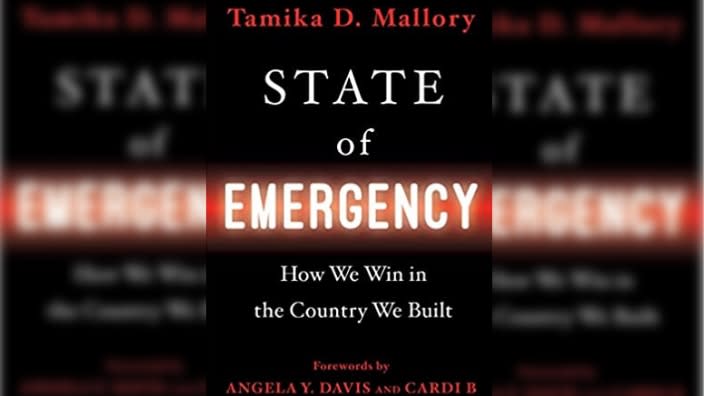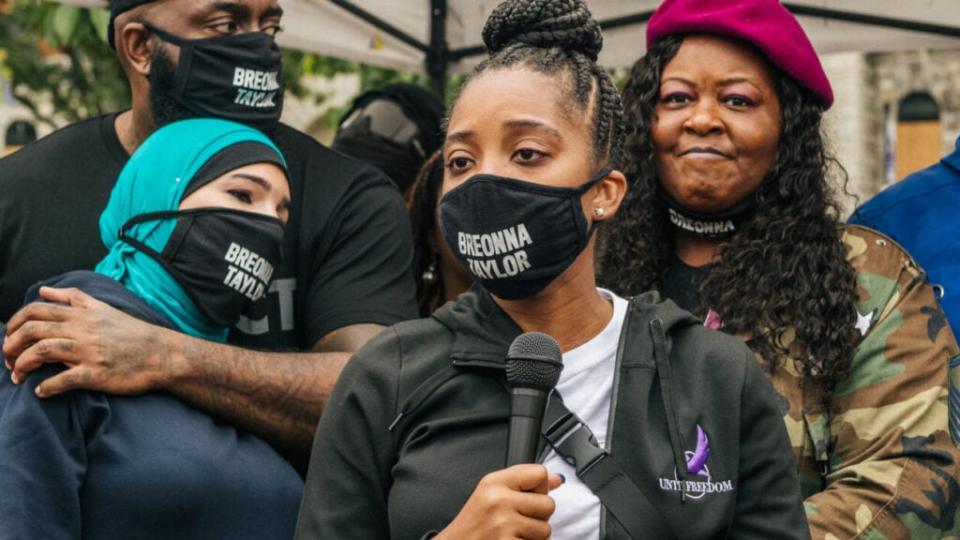Tamika Mallory’s ‘State of Emergency,’ a front-row seat to a masterful political performance
- Oops!Something went wrong.Please try again later.
Opinion: In her first book, BLM activist Tamika Mallory offers a powerful polemic about a crisis in America and how to cure it
As a child growing up in the Black freedom movement with parents who were allied with Reverend Al Sharpton‘s National Action Network, on Saturday mornings, Tamika D. Mallory attended freedom rallies and spent time in the community instead of watching cartoons.
As a teen, her first instinct was to rebel against their all-consuming focus. As befitting the professional activist she is in her own right today, her first book, State of Emergency, is a powerful polemic about a crisis in America and how to cure it.
In a conversational yet commanding style, Mallory delivers fiery argument for substantive social change, rhetoric made real by a deeply personal perspective. There’s no distance between subject and speaker here, and the personal ethos, her identity and credibility as an activist, and the deep wellsprings of emotion she taps into are significant aspects of what makes the book work.
This is a very personal story and that heartfelt connection shines through. Tamika Mallory grew up in “the middle of Harlem.” She claims the knowledge of the streets as her birthright: “Manhattanville projects raised me. I earned my degree from the streets on the corner of 133rd and Old Broadway.”
But she also enjoyed substantial privileges by virtue of her education.
I participated in two communities growing up. One of privilege in the private schools that educated me. The other without privilege, where my perspective was shaped on the way the world works. That dance with privilege gave me an early understanding of just how poorly served the Black community is in this country. That was one of the motivations that pushed me to the modern movement for justice.
Yet Mallory doesn’t lean exclusively on either emotion or personal connection alone. State of Emergency has personal elements but it’s primarily a work of political communication, not memoir. Fully developed political frames typically perform four functions: they define problems; identify the root causes of the problem; perform moral judgments or allocate blame; and finally, as the culmination of all that analysis, they suggest remedies for eliminating or ameliorating the problem.’

Mallory effectively hits all four. With solid research and a small cast of expert witnesses supporting her, she delivers a multidimensional analysis of what ails Black America, shaming the devil, and suggesting a host of escape routes from conditions that she says create the feeling of life in a war zone and one of her colleagues likens to hell.
While the third and final section provides the bulk of recommendations, sections one and two of State of Emergency — “How We Got Here” and “Where We Are” — set the stage. This is where Mallory assesses the state of Black America, and the picture she paints is bleak. Mallory is a Black Lives Matter activist deeply concerned not just with police violence and white supremacy, but more broadly, with social injustice that cuts lives short: “Under-resourced neighborhoods like the one I grew up in foster a sense of desperation,” she reports. She’s troubled by hunger, crime and over-policing, as well as the deleterious effects of trauma on mental health:
When we send young men and women off to war, the government at least pretends to provide therapy and diagnoses for those who struggle with PTSD afterward. When you’re in the ghetto and see your neighbors gunned down on a regular basis, the system offers no sympathy, but the trauma still exists.
Mallory comes by her passion and her righteousness organically. In State of Emergency, as in life, the personal and the political are inextricably intertwined, and one of the book’s greatest strengths is that she’s unafraid to expose her personal scars. The core thesis about systems and effects is tied to the death of her son’s father, Jason, when she was just 19.
There were a lot of different failures within the framework of the hood that led to that moment. It was not only inevitable, in Jason’s case, but likely to happen again to another Black man. It took personal tragedy for me to begin to connect the dots between the violence in my community and the violence of the system around that community.
Desperation put him on a deadly path, and it’s not an excuse — it’s just the reality of his plight.

Though she sometimes paints in broad strokes, drawing on lifelong personal experience, there is substantial truth on these pages, especially in the discussion of how drugs, violence and mental health intersect. As Mallory contends, “Drugs are coping mechanisms used to treat the trauma of an experience that is inescapable.”
Casting community taboos against talking about mental illness aside, she is asking urgent and necessary questions, such as “How is it that we consider the mental wellness of every person except those living in our most distressed communities?” We see this double standard every day: “Where the average person can obtain support services, or even pop a pill to take the edge off their pain, Black and brown people endure until they can’t anymore.”
How Black people cope with these conditions and with a culture hostile to who we are from childhood is another ongoing theme. In Chapter 4 and interspersed in subsequent chapters thereafter, Mallory identifies what she calls “The Rules.” These are “the rules we all must remember to follow in order to get by” — the unspoken yet taxing racial etiquette of survival as a Black person in America, the implicit way we learn to tamp down who we are to get along and maybe sometimes get ahead.
Black readers will recognize the truth in this exhausting list that begins with “Rule #1: Do not raise your voice when faced with any challenge. Consequence: They will call you angry,” and “Rule #2: Do not wear any hairstyle that could be deemed “ethnic” in a professional or scholastic setting. Said styles include braids, locs, Afros, bald heads, natural curl patterns. Consequence: They will touch your hair, assume you’re unkempt, and call you ghetto. In extreme cases, you may be expelled or fired from the institution.”

Vote and Build
Despite the entrenched problems she documents, Tamika Mallory is both optimistic and fiercely determined, arguing that transformational change is within reach if only we have the will to seize it: “Crime isn’t out of control because we don’t have enough police officers, it’s uncontrollable because the community is not nurtured. If you plant seeds of order, seeds of opportunity, they will grow.”
What makes the book effective is that throughout it criticism is wed to a prescriptive remedy. In Section 3, “Where We’re Going,” arguably the main attraction, solutions to problems are the primary focus.
In truth, while her historical analysis is uneven, the calls to action, advice, and policy prescriptions are the book’s most significant contributions. Mallory advocates a three-pronged, cohesive approach to creating change. “IF YOU PROTEST BUT DON’T GO TO THE POLLS, YOU HAVEN’T FINISHED THE JOB,” Mallory admonishes. “Our model should be protest, politics, policy.”
In Chapter 9 she provides much-needed substance for the simultaneously controversial and popular slogan “defund the police.” Adding the corollary “refund our communities,” Mallory provides a fact-based, historically grounded critique of over-policing and advocates for diverting those funds to a host of constructive, socially focused initiatives. As she reassures readers, “Nobody is saying that people should not have entities to call when they’re in harm’s way, but we need to dismantle policing and surveillance as they currently exist and build new models of safety.”

So, rather than pouring good money after bad into the “money pit” of modern policing (already 20 to 50% of city budgets), that means redirecting funds to schemes have been proven effective, using that money to create new infrastructure and decrease the need for a militarized police presence. Those services would include: Mental health services; Drug treatment programs; affordable and quality housing; job placement; and universal basic income and after-school programs for youth. Chapter 14 is a more detailed discussion of a wide array of policy prescriptions.
Yet another strength is knowing when to recruit other voices and when to bring the receipts. In addition to forewords by Cardi B and Angela Davis, guest speakers/writers include Mysonne Linen and Angelo Pinto, co-founders of Mallory’s organization Until Freedom, and the Muslim American, Palestinian American political activist Linda Sarsour. She’s practicing what she preaches.
In a revealing passage on The Women’s March, Mallory invokes yet another rule for surviving while Black: “Black people must always have a witness to prove their truth.” So Mallory invites Linda Sarsour to bear testimony to the difficulties she experienced organizing alongside white women who resisted bringing a much-needed racial critique in the Women’s March.
That said, despite thoughtful and thought-provoking analysis and candor, Tamika Mallory is primarily an activist and public speaker steeped in the rhetoric of agitation. As such she’s fond of her rhetorical tools. She takes artistic liberties at times, using exaggeration and generalizations for rhetorical effect. In reference to guns and drugs she writes: “These tools of self-destruction are put in the hands of young Black men more often than any schoolbooks.” Does every boy in Harlem or inner-city Baltimore get a gun?

Mallory also likes a strawman, chiding “modern history books” for painting a rosy picture of slavery that underplays its brutality. While conservatives are trying to champion a revisionist American history that paints that picture, characterizing those efforts “modern history” erases the work done by African American historians and scholars of slavery and mischaracterizes consensus.
In addition, Mallory’s gender analysis is sometimes confusing. She seems particularly concerned with the loss of heteronormative structures in Black communities. She locates single-parent households somewhere between drugs, guns, hanging out with friends and “laughing at the neighborhood crackhead” as parts of her neighborhood culture that made her “numb to violence in proximity“ and desensitized to the “abnormality” of “growing up in those circumstances.”
After condemning patriarchy, it’s jarring to see her mourn the loss of “patriarchs” in Black communities — not just Black men, but the figure of the “patriarch” specifically. And along with that, implicitly conventional Black family structure. She bemoans welfare reform as “a weapon used to weaken and harm Black families — as if locking up our Black men and our civil rights leaders weren’t enough. As if infusing inner-city neighborhoods with drugs weren’t enough. As if taking away the family structure by locking up the patriarchs of a community weren’t enough.”

At another point, Mallory argues that “doing nothing” is like “strengthening the neglectful patriarchy built on our foundation of racism.” Those are interesting qualifiers — calling out a “neglectful” patriarchy driven by racism implies that there is a version of patriarchy that might be more acceptable. Patriarchy also comes up as a way that America gives with one hand and take with the other:
America has a way of giving a little only to come back and take a lot…Give us government assistance only to take the patriarchs of our household. Give us the illusion of freedom only to hold our civil liberties hostage.
The cumulative effect of these references to patriarchs and patriarchy is of someone pledging to destroy the patriarchy, while identifying as a victim of the patriarchy, and also mourning the absence of patriarchs. That’s a thin needle to thread. Ideally, Mallory would explain how and why this should be done. Otherwise, Tamika Mallory’s message may not be as welcoming and inclusive to readers as she hoped.
Gender trouble aside, reading State of Emergency is generally an invigorating experience, like a front-row seat to a masterful political performance. Among activists, allies, and accomplices especially, her message will resonate. Many heads will nod.

Dr. Carole V. Bell is a Jamaican-born writer, researcher, and media and political communication scholar whose work focuses on public opinion and the politics of entertainment. An enthusiastic Tar Heel, Carole earned a Ph.D. in Political Communication from the UNC-Chapel Hill School of Journalism and Media, a Masters in Television and Radio from Brooklyn College, and a B.A. from Harvard University.
Have you subscribed to theGrio’s “Dear Culture” podcast? Download our newest episodes now!
TheGrio is now on Apple TV, Amazon Fire and Roku. Download theGrio.com today!
The post Tamika Mallory’s ‘State of Emergency,’ a front-row seat to a masterful political performance appeared first on TheGrio.

